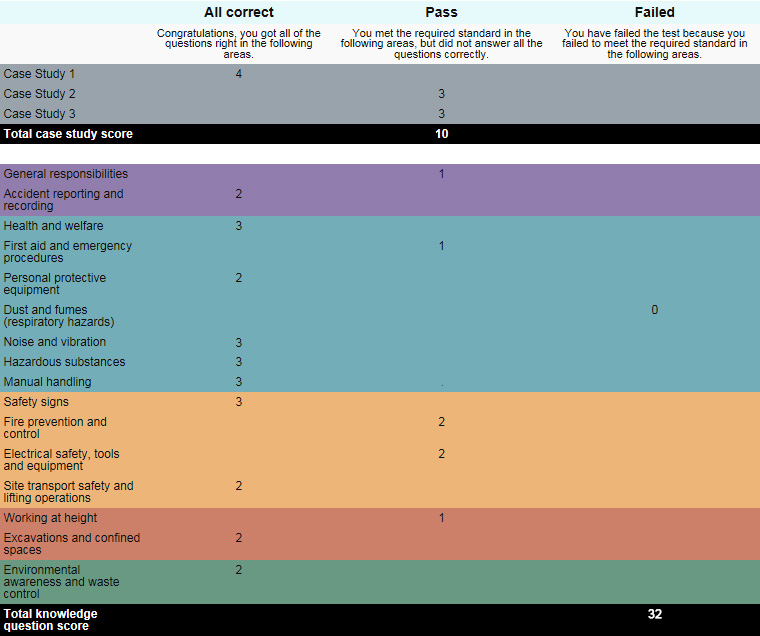After 26 June 2019, the format of the CSCS Test changed meaning the CSCS Test pass mark and scoring system also changed. Candidates taking the test after this date will need the following marks to pass the test:
- The CSCS operative test pass mark is 45/50.
- The CSCS specialist test pass mark is 45/50.
- The CSCS managers and professionals pass mark is 46/50.
The test consists of 50 knowledge questions.
Prior to this date, the test also contained behavioural case study questions. These questions have since been removed and the scoring mechanism is now easier to understand.
Contents
The information presented below applies to tests taken before 26 June 2019:
The CSCS Test pass mark is quite confusing in that there isn’t a single minimum score that needs to be obtained in order to pass, as is the case for most tests and exams. The CSCS Test utilises what is known as sectional scoring which means you need to get a minimum score for each section of the test, in order to pass the test as a whole.
We will break down the structure of the test in order to better explain the CSCS Test pass mark. The test is made up of 50 questions, which consist of case studies and knowledge questions. You can score a maximum of 50 points for the test.
Case Studies
There are 12 questions from 4 case studies, which appear at the start of the test. Each CSCS case study has 3 questions. Therefore you can score a maximum of 12 points from these case studies.
Knowledge Questions
There are 38 knowledge questions from 16 categories spanning 5 key sections. These 16 categories are:
A: Legal and management: ○ Accident reporting and recording ○ General responsibilities
B: Health and welfare: ○ Dust and fumes (Respiratory hazards) ○ First aid and emergency procedures ○ Hazardous substances ○ Health and welfare ○ Manual handling ○ Noise and vibration ○ Personal protective equipment
C: General safety: ○ Electrical safety, tools and equipment ○ Fire prevention and control ○ Safety signs ○ Site transport safety and lifting operations
D: High-risk activities: ○ Excavations and confined spaces ○ Working at height
E: Environment: ○ Environmental awareness and waste control
CSCS Operative Test Pass Mark
The CSCS test aims to ensure that all workers in the construction industry have comprehensive knowledge of all 16 categories of the test, being aware of all the issues that might affect them onsite. Therefore; if you get all the questions from a particular category wrong (for example the CSCS working at heights questions) you will not pass the test even if you get all the other questions in all the other categories correct.
In order to pass the test, you will have to meet the minimum standard for each individual category as well as for the test overall:
- the pass mark for each case study is 3: and you also have to score 10 out of 12 overall.
- the pass mark for each core knowledge category is 1, and you also have to score 32 out of 38 overall.
CSCS Pass Mark Example
Let’s have a look at an example scorecard for further clarification:
This is the scorecard from a candidate who failed the test. Despite getting the minimum score required for the case study section (10 out of 12) and the knowledge section (32 out of 38), the candidate failed as he didn’t answer any questions correctly in the Dust and fumes (respiratory hazards) section. Had he just answered one question correctly from that section, he would have passed the CSCS Test.
The above example shows it is imperative to have a well-rounded understanding of CSCS theory. Lacking knowledge in just one category can lead you to fail the test. Take a CSCS mock test to see how you do.
CSCS Managers and Professionals Pass Mark
The CSCS Managers and Professionals pass mark works in exactly the same manner as the CSCS Test pass mark for operatives, although you should keep in mind that the managers test has three additional knowledge categories, bringing the total number of categories to 19. These additional categories are:
- CDM (Construction (Design and Management))
- Demolition
- Highway Works


